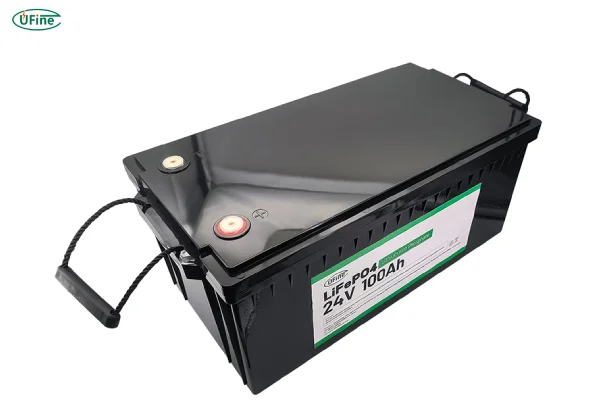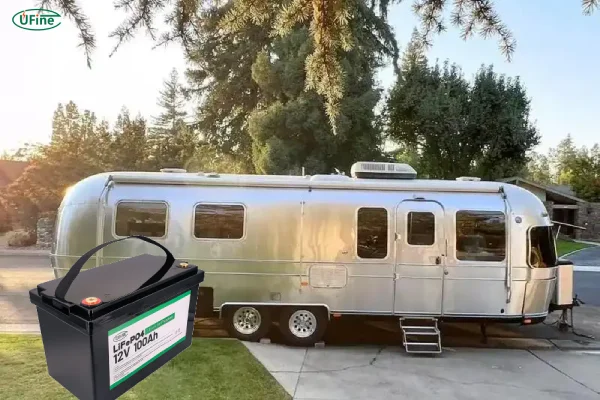Part 1. 100Ah lithium battery type
A 100Ah lithium battery is typically a lithium iron phosphate (LiFePO4) battery. This type of lithium battery is known for its exceptional safety, stability, and long lifespan. Unlike traditional lead-acid batteries, lithium-ion batteries, specifically LiFePO4, offer higher energy density, lighter weight, and more efficient charging, making them ideal for various applications that require reliable and long-lasting power.
LiFePO4 batteries are built with a unique chemical composition that reduces the risk of overheating and fires compared to other lithium-ion technologies. These batteries are often favored for renewable energy systems, electric vehicles, RVs, and even backup power applications.
Part 2. Understanding battery Ah
The ah of a battery refers to how much energy it can store and release, usually measured in ampere-hours (Ah). In the case of a 100Ah lithium battery, it can supply 100 amps of current for one hour, or 1 amp of current for 100 hours, depending on the load. The higher the Ah rating, the greater the capacity of the battery to power devices for extended periods.
A 100Ah battery is considered medium-to-high capacity for most small-to-medium applications. It’s often used to power off-grid homes, RVs, boats, and other systems where reliable and long-lasting power is needed without constant recharging.
Part 3. The voltage of the 100Ah lithium battery
A 100Ah lithium battery typically operates at a nominal voltage of 12V, 24V, or 48V, depending on the specific application.
- 12V systems are common for RVs, solar applications, and small power systems.
- 24V systems are often used for larger solar energy systems or more demanding applications where higher voltage and more power are necessary.
- 48V systems are usually found in high-power setups like large off-grid solar systems, electric vehicles, or commercial energy storage.
The voltage plays a critical role in determining the efficiency and compatibility of the battery with your devices. A higher voltage allows for more power transfer with less current, reducing energy loss and improving efficiency.
Part 4. Factors that affect battery runtime
Several factors can influence the runtime of a 100Ah lithium battery, including:
- Load: The amount of current drawn from the battery directly impacts its runtime. For example, if you’re using high-power appliances, the battery will drain faster.
- Temperature: Extreme cold or heat can reduce the battery’s performance. Lithium batteries operate best in moderate temperatures.
- Depth of Discharge (DoD): This refers to how much of the battery’s capacity is used. A 100Ah lithium battery should ideally only be discharged to about 80% to maintain its lifespan.
- Battery Health: Over time, batteries naturally degrade. Regular maintenance and proper charging practices can help extend their lifespan.
- Charging Cycle: A battery’s lifespan is determined by the number of charge-discharge cycles it undergoes. The more cycles, the shorter the battery’s life.
How Temperature Affects Battery?
Part 5. How long to charge a 100Ah lithium battery?
Charging time for a 100Ah lithium battery depends on the charger used and the current provided to the battery. Generally, lithium batteries charge faster than lead-acid batteries. For example:
- Using a 20-amp charger, it would take about 5-6 hours to charge a 100Ah lithium battery from 0% to 100%.
- With a 40-amp charger, this time could be cut in half to about 2-3 hours.
Keep in mind that charging times may vary depending on the battery’s state of charge and environmental conditions.
Part 6. What can I run off a 100Ah lithium battery?
A 100Ah lithium battery is versatile and can power a wide range of devices, including:
- RVs and Campervans: You can run lights, fans, TVs, and other appliances for several hours on a single charge.
- Solar Power Systems: A 100Ah lithium battery can store energy from your solar panels and power your home or cabin during the night or on cloudy days.
- Electric Vehicles (EVs): Depending on the vehicle’s energy requirements, a 100Ah lithium battery can be used to power smaller electric vehicles like e-bikes, scooters, or go-karts.
- Power Tools: Cordless power tools, including drills and saws, can be run off a 100Ah battery for extended periods.
However, the runtime for each device will depend on the power consumption of the device in watts (W). For example, a 100-watt device could run for about 10 hours on a 100Ah battery, while a 1,000-watt device will drain the battery much quicker.
Part 7. How long does a 100Ah lithium Battery Last?
The lifespan of a 100Ah lithium battery is typically measured in charging cycles rather than years. On average, a lithium-ion battery can last anywhere from 3,000 to 5,000 charge cycles, depending on factors like depth of discharge, temperature, and charging habits.
The runtime of a 100Ah lithium battery depends on the power consumption of the devices you’re running and the battery’s voltage. To calculate how long a 100Ah lithium battery will last, we need to consider its watt-hour (Wh) rating, which can be calculated from its ampere-hour (Ah) and voltage (V).
Calculating Watt-Hours for a 100Ah Lithium Battery
The formula to calculate watt-hours is:
Watt-hours (Wh)=Amp-hours (Ah)×Voltage (V)
For a 12V 100Ah lithium battery:
Wh=100Ah×12V=1200Wh
For a 24V 100Ah lithium battery:
Wh=100Ah×24V=2400Wh
For a 48V 100Ah lithium battery:
Once you know the watt-hours, you can estimate how long the battery will power your devices based on their wattage.
Factors Affecting Battery Runtime
- Device Power: The more power-consuming your device, the shorter the battery will last.
- Temperature: Batteries perform less efficiently in extreme heat or cold.
- Battery Health: Older batteries may not last as long as new ones.
- Depth of Discharge (DoD): The further you discharge your battery, the fewer cycles it will last.
Part 8. How to maximize the performance of a 100Ah lithium battery?
To extend the life and maximize the performance of your 100Ah lithium battery, follow these best practices:
- Avoid Deep Discharge: Try to discharge your battery no more than 80% for a longer life.
- Store Properly: If you’re not using the battery for extended periods, store it in a cool, dry place at around 50% charge.
- Maintain a Moderate Temperature: Lithium batteries perform best at temperatures between 20°C and 25°C (68°F – 77°F).
- Use a Good Charger: Always use a charger that is designed for your 100Ah lithium battery to prevent overcharging or undercharging.
- Avoid High Discharge Rates: Using high-power devices continuously will reduce the battery’s lifespan.
Part 9. Which 100Ah lithium battery is best?
When selecting a 100Ah lithium battery, it’s important to consider the brand, quality, and features. Here are five recommended 100Ah lithium batteries that are known for their durability and performance:
-
Ufine Battery 100Ah Lithium Battery
Known for its long cycle life and reliable performance, Ufine Battery is ideal for solar power systems, RVs, and backup power systems. -
Renogy 100Ah Lithium Iron Phosphate Battery
A top choice for off-grid applications, it features advanced battery management systems and long cycle life. -
Battle Born 100Ah LiFePO4 Battery
A rugged and compact option with excellent thermal stability, ideal for RVs, boats, and renewable energy systems. -
Victron Energy 100Ah Lithium Battery
A high-quality option for both home and commercial use, known for its reliability and performance in extreme conditions. -
ExpertPower 100Ah Lithium Battery
This high-capacity lithium battery is designed for use in solar systems, off-grid applications, and RVs, offering good value for its performance.
Part 10. Key features to look for
When purchasing a 100Ah lithium battery, consider the following key features:
- Cycle Life: Look for batteries with a high cycle life to ensure long-lasting performance.
- Voltage: Choose the appropriate voltage for your system.
- Built-in Battery Management System (BMS): Ensures safety, temperature regulation, and protects against overcharging.
- Weight: Lithium batteries are lighter than lead-acid, which makes them easier to transport and install.
- Warranty: Opt for a battery with a warranty of at least 5 years for peace of mind.
Part 11. How much is a 100Ah lithium battery?
The price of a 100Ah lithium battery can vary based on factors such as brand, voltage, and features. On average, a 100Ah lithium battery costs between $500 and $1,000.
Factors Influencing Price:
- Battery Chemistry: LiFePO4 batteries tend to be more expensive than traditional lithium-ion batteries.
- Brand: Trusted brands like Ufine Battery or Renogy tend to be more expensive due to their reliability and quality.
- Cycle Life: Batteries with longer cycle lives and superior warranties tend to be priced higher.
- Included Features: Batteries with advanced battery management systems (BMS) or Bluetooth monitoring capabilities will generally be more expensive.
Related Tags:
More Articles

How to Choose the Best Floor Scrubber Battery for Commercial Cleaning?
Selecting the ideal floor scrubber battery ensures a long runtime, rapid charging, and minimal maintenance for efficient commercial cleaning operations.
Battery for Blower vs Battery for Leaf Vacuum: Which One Should You Choose?
Battery for blower vs leaf vacuum—learn the key differences in power, fit, and runtime to choose the right battery for your outdoor tool needs.
How to Choose the Right Battery for Blower?
Choosing the right blower battery? Consider voltage, capacity, chemistry & usage. This guide helps match the best battery for peak performance.
How to Choose the Best Insulated Battery Box for Lithium Batteries?
Choosing the Best Insulated Battery Box for Lithium Batteries? Discover key factors such as size, material, and safety for optimal protection and performance.
7 Critical Elements on a Lithium Battery Shipping Label
What must be on a lithium battery shipping label? Learn 7 key elements to ensure safety, legal compliance, and correct handling across all transport modes.





